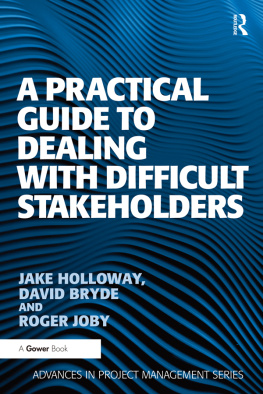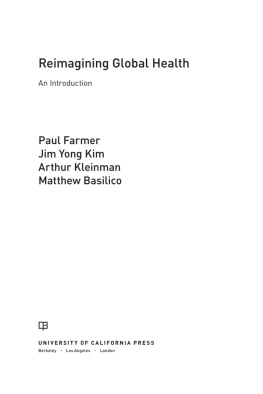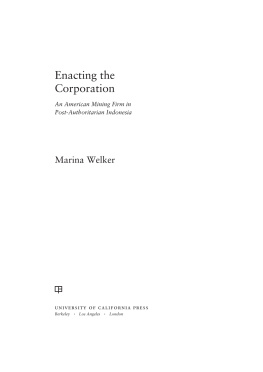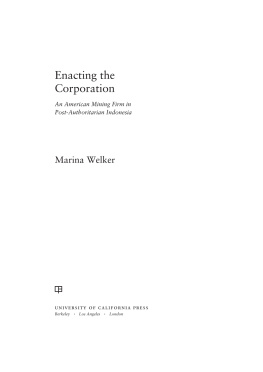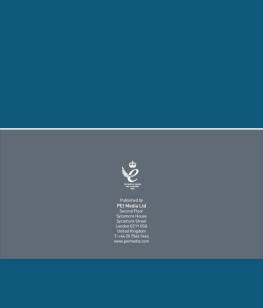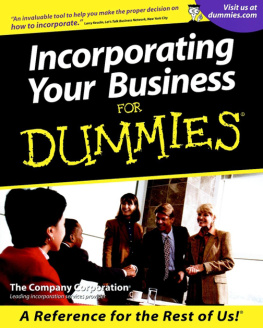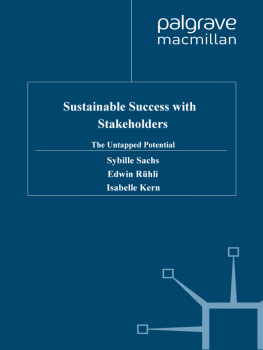THE CORPORATION AND ITS STAKEHOLDERS
Classic and Contemporary Readings
Edited by Max B.E. Clarkson
The term stakeholders defines a group much broader than a corporations shareholders. It includes employees, customers, suppliers, and governments, and extends to anyone who benefits from the company There is considerable debate, given that large multifunctional corporations are now the dominant form of economic organization worldwide, about how responsive and accountable companies should be to their stakeholders. This debate includes fundamental questions such as: Who should be considered stakeholders? Which stakeholder interests should a corporation take into account? How should stakeholder interests be balanced against shareholder objectives (such as profits)? What changes should be made to corporate governance to reflect these new interests?
This anthology is designed to sharpen the debate about the role and purpose of the corporation in society through the provision of seminal articles on the concept and recognition of stakeholders, and the integration of stakeholder interests into decision making. It provides a theoretical base for managerial action, and will assist researchers in planning further studies to shed light on the issues involved.
MAX B.E. CLARKSON is Director of the Clarkson Centre for Business Ethics, and Professor Emeritus in the Faculty of Management at the University of Toronto.
The Corporation and Its Stakeholders: Classic and Contemporary Readings
Edited by Max B.E. Clarkson

University of Toronto Press Incorporated 1998
Toronto Buffalo London
ISBN 0-8020-4300-3 (cloth)
ISBN 0-8020-8127-4 (paper)

Printed on acid-free paper.

Canadian Cataloguing in Publication Data
Main entry under title:
The corporation and its stakeholders : classic and contemporary readings
ISBN 978-0-8020-4300-9 (bound) ISBN 978-0-8020-8127-8 (pbk.)
1. Corporations. I. Clarkson, Max B.E.
HD27311.C67 1998 338.74 C97-932226-X

University of Toronto Press acknowledges the support of the Canada Council for the Arts and the Ontario Arts Council for its publishing program.
Contents
Clarkson, Max B.E., University of Toronto
Clark, J.M., University of Chicago
The Journal of Political Economy (Vol. 24, #3, 1916) 209-229.
Dodd, E. Merrick, Harvard Law School
Harvard Law Review (Vol. 45, #7, May 1932) 1145-63.
Blair, Margaret M., The Brookings Institution
Chap. 6 in Ownership and Control: Rethinking Corporate Governance for the Twenty-First Century. (Washington, D.C.: Brookings Institution, 1995) 202-234.
Carroll, Archie B., University of Georgia and Juha Nsi, University of Jyvskyl
Business Ethics a European Review (Vol. 6, #1, January 1997) 46-51.
Sen, Amartya, All Souls College, Oxford
Social Philosophy & Policy (Vol. 2, #2, 1985) 1-19.
Goodpaster, Kenneth E., University of St. Thomas
Business Ethics Quarterly (Vol. 1, #1, 1991) 53-73.
R. Edward Freeman, University of Virginia
In Ethical Theory and Business, edited by Tom L. Beauchamp and Norman E. Bowie. (Englewood Cliff, N.J.: Prentice-Hall, 1994) 66-76.
Carroll, Archie B., University of Georgia
In Understanding Stakeholder Thinking, edited by Juha Nsi. (Helsinki, Finland: LSR - Publications, 1995) 47-74.
Donaldson, T., Georgetown University and L.E. Preston, University of Maryland
Academy of Management Review (Vol 20, #1, 1995) 65-91.
Jones, Thomas M., University of Washington
Academy of Management Review (Vol 20, #2, April 1995) 404-437.
Clarkson, Max B.E., University of Toronto
Academy of Management Review (Vol 20, #1, 1995) 92-117.
Mitchell, R. K., University of Victoria, B. R. Agle and Donna J. Wood, University of Pittsburgh
Academy of Management Review (Vol 22, #4, 1997) 853-886.
Wood, Donna J., and R. E. Jones., University of Pittsburgh
The International Journal of Organizational Analysis (Vol. 3, #3, 1995) 229-267.
Foreword:
Redefining the Corporation
The Alfred P. Sloan Foundation, named for one of the founders of General Motors, has long had an interest in the role of the corporation as a central and characteristic institution of American society. This interest has intensified and broadened as US-based firms have penetrated foreign environments, foreign-based firms have become active in the US, and a global system of competition and interdependence has evolved. Within this new global setting, trends affecting the operations and status of all kinds of firms, both domestic and multinational, require analysis, and the potential effects of differences in policies, practices and governance structures among firms based in different national jurisdictions demand critical examination.
In 1995, a representative of the Foundation proposed that a small group of scholars interested in the status and future of the corporation establish an international network of scholars and practitioners in order to launch a program of research and discussion that might lead to new thinking and new knowledge in this area. The result of this initiative is the Redefining the Corporation Project, which has now established an e-mail network, created a website, and arranged several invitational seminars and open conference programs. A number of small research grants have been awarded to support individual empirical studies, and a larger core project involving careful study and comparison of a few large, multinational corporations has been started.
The purpose of all of this activity is to redefine the corporation as an entity within the economy, polity and society. The focus of this redefinition effort is the stakeholder model of the corporation, the concept of the corporation as a network involving multiple participants, and interests, each of which may make contributions and receive rewards as a result of a corporate activity. As Clarkson emphasizes in his Introduction, below, there has been an increasing amount of discussion, both public and academic, about the nature and purpose of the corporation in recent years, and it is apparent that the stakeholder model has gained considerable acceptance among both scholars and executives. However, neither the empirical evidence of stakeholder orientation, nor its operating and performance implications, have been fully explored.
The Redefining the Corporation Project begins with a simple proposition: Corporations ARE what they DO. The Project aims to examine the nature of the corporation from this perspective, raising questions such as the following:
How are stakeholder interests manifested and recognized, and how does corporate management deal with them?
Do corporations that profess and attempt to implement stakeholder-orientation policies actually behave any differently or achieve any different performance outcomes than others?
Do differences in stakeholder orientation among firms based in different political jurisdictions have any effects on their global competitive interaction, success or failure?
Next page

